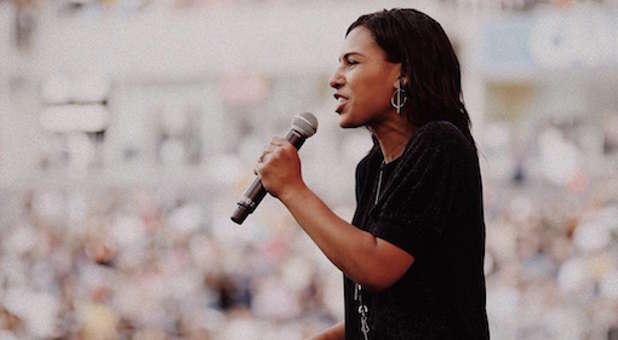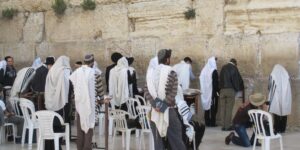Holy Spirit Radically Transforming College Campuses Nationwide
Young people across the country are coming into radical relationships with Jesus Christ. As a member of the Circuit Riders ministry, Yasmin Pierce sees these transformations happen regularly as part of her job.
Pierce spoke to Charisma about how the Holy Spirit is moving on college campuses, particularly among young women, and why God’s desires need to become our desires.
This interview—originally recorded for our “New Year, New Voices” podcast series—has been edited for length and clarity. Listen to the full interview here.
Berglund: Would you mind sharing your testimony?
Pierce: I come from a family of two different kinds of religious backgrounds. My mother is Lutheran from Germany, and my father is African American, from the South, and grew up Baptist. We were a church-attending family, so I grew up going to both churches. We were really more nominally Christian and went for the sake of having that Sunday time with God, but that didn’t really carry through for the rest of our week. But I do remember being confirmed in the Lutheran Church and just having this fascination with the Bible. The concept that we could have a relationship with God was always very interesting to me. But that’s kind of where it ended.
And then I just had the vacation Bible camp moment, where for the first time you’re away from your family, and you’re really presented with the question of “What will be my decision for my life?” for the first time in middle school. And really, that’s where I would say I really encountered God for myself and encountered Jesus and a fuller understanding of the gospel.
That was really a life-changing time for me—a life-marking time—and I distinctly remember thinking two primary thoughts at that time. One was, if God is real, I couldn’t imagine having a life that doesn’t respond to Him. The concept of living knowing that God is real but not having a response to Him as a lifestyle just seemed totally crazy to me. So that was one: that if He’s real, I have to follow Him. The second was just a thought of what Jesus accomplished on the cross. The reality of going from death to life by following Jesus was so profound to me and obviously such a stark difference of what your life could end up looking like. I just remember the simple thought of, If my whole life effort could just come together for even one person to make that decision to follow Jesus, all of that effort would be worth it.
For me, that simple summer camp really set the course for my life. In our generation, we can be cynical sometimes about events and gatherings. It doesn’t all happen at one moment, but I just believe and we see it scripturally that God can do so much in one gathering. For me, that set the course of my life.
In high school, I started going to a church where we’d see on a regular basis people coming to faith in Jesus. And really, that was the primary ambition and life goal for me. I wanted to see people come to faith in Jesus. So I ended up going to college, studied politics really with that heart of “How can the church go into areas of state failure, of countries suffering economically, and see the church make a difference and really bring the gospel to that place?”
But the real final turning point for me, even in that environment, was that I remember being a freshman on campus, and I went to school at Columbia University in New York City. So it was a big environment change for me. I grew up in Virginia, where everyone’s at least been exposed to the gospel, and now I was in New York City, where you talk to some people and the most they know about Jesus sometimes is just Christmas and Santa Claus. Being in that environment as a freshman, my eyes opened to the reality that 90 to 99% of this campus doesn’t know Jesus or have a relationship with Jesus.
In that place, the need that’s on college campuses really struck me—that these institutions are where our world leaders come from, and I had a peek into the spiritual health of them for the first time. That is where the further direction of my life really took off.
Berglund: Tell me a little bit more about your work through Circuit Riders.
Pierce: Circuit Riders is a branch of Youth with a Mission (YWAM). YWAM exists to send young people and to empower them as missionaries all throughout the world. Usually when you join YWAM, as an American, you’re thinking of going to another country or continent: to India, to Africa, to South America. But at Circuit Riders, our heart is to say, “The cities of America and the university campuses of America need the gospel just as much as other nations do.”
So, for us, we train young missionaries, leaders, communicators and worship leaders to go to university campuses, establish relationships there and really see the gospel go forward. For myself and my husband, we work on a team that works on a project called Carry the Love. Carry the Love is a campaign to inspire a generation to love like Jesus. A few years ago, our team looked at the state of campuses and saw that, on most college campuses, there’s really only about 5% of the student body that’s engaged in any intentional worship environment or Bible study—any Christian community on campus. We’ve talked to other campus ministry organizations, and this is the trend across campuses—usually 95% of the student body is not engaged in any sort of Christian community. Of course, as missionaries, we would look at that and say, “That’s not OK. How can we serve to make a difference?”
What we do with Carry the Love is we go from campus to campus establishing relationships. It’s really a grassroots, friendship-based initiative. We first bring together believers in one place, because we realize to reach that 95% that doesn’t know Jesus, it starts with the believers on campus, and it starts with the culture among the believers. So we come together. We do worship nights with believers and invite even those who are maybe seeking God and curious: “Is Jesus real? What does He have to do with my life?” We invite them to these worship nights.
Those are really times for believers on campus to make a personal life decision and a cultural decision between their groups to say, “Hey, we’re not going to exist here on campus just to get by and check the box and say, ‘OK, we’re believers.’ We’re really on a mission on our campus, and God’s put us in the midst of a harvest. And we really have influence to see Jesus known.” The heart of those nights is really to make a decision to say, “We will carry the love of Jesus to the rest of the harvest here. We will carry the love of Jesus outside of these four walls.”
When we do those gatherings together, we see many Christians honestly revived in their faith and revived even in their personal understanding of the gospel and understanding of the cross. Many times we see nonbelievers come to faith actually in those gatherings. A lot of times they end up in spontaneous nights of baptisms, extended times of worship and prayer, and it’s really a powerful kind of encounter.
But we don’t actually end there. We usually have a second day on that campus where we say, “Okay, now let’s make what we just talked about real, and let’s actually have a time in the afternoon where we go out and share the gospel.” And on campus after campus, we see students for the first time ever communicating the gospel on campus to other students—many times seeing them actually making a saving decision to follow Jesus.
We also have men’s breakout times, and we have women’s breakout times called Brave Love. We really just help to serve with the students and catalyze further gospel movement on their campuses. So, of course, we’ve seen so many testimonies of what God’s done over the years. From about January to May 2019, we went to about 300 different universities in America, a few of those being actually in Europe, in the U.K., as well. We saw about 40,000 young people gather. (That is for both university campuses and high schools.) And we saw about 2,000 make decisions to follow Jesus.
Of course, in that, there are so many personal testimonies of what the Lord’s done. But one of my favorite stories—just for a snapshot of what it looks like—is at a school in Michigan called Western Michigan University. Anyone who’s from that area in Michigan knows it’s actually called lovingly by people in the area, “Waste-ern,” because it has a reputation that people go just for the party culture, to drink and so forth. So, the Christians there said, “Man, we really want to do one of these Carry the Love two-day experiences. We want to see the gospel known more on campus.”
So, they partnered with us. We put together a worship night. And to our surprise, we opened the doors for that night, and hundreds of students flooded in, mostly from the fraternities, sororities and athletic clubs. We were amazed at the turnout. We preached the simple gospel, gave an invitation and said, “Hey, if you’re hearing this gospel, and you’re deciding tonight, ‘I want to make Jesus Lord and Savior of my life. I want to surrender my life to Him,’ we just encourage you in front of everyone to just stand up right now.” And all across the room students stood up crying, moved by the love of God. And one of those students was a little gymnast freshman girl. (For the sake of this, I’ll give a different name. Let’s say her name is Sarah.) She stood up crying, and her friend who brought her gave her a big hug. She was just so moved that Sarah made this decision to follow Jesus. We wrapped up the night, and we had the second day.
Weeks later, we’re hearing testimonies from the students there, and we hear that Sarah, the first-year student who just came to faith in Jesus, just four days later is sharing the gospel on her campus. And in her dorm, she’s leading her friends to faith in Jesus four days after herself giving her life to Jesus. Then after that, she mobilizes a team that comes for leadership training, to say, “How can we keep doing events like this on our campus? How can we keep stepping out as leaders?” So the whole team comes over the summer to get trained at a leadership camp that we do. So they come and then they start making plans: “We want to get a gym, and we want to fill it with even hundreds more students than last time. We want to do another worship night.”
So, our team visits in the fall to meet up with some student leaders and pray about that. And Sarah’s there. We get into her room just to meet with a few students, and Sarah has gathered 40 different leaders on campus—student leaders—in the room. We’re shocked. She’s a sophomore at this point.
And she gets up in front of that room full of student leaders and she says to them, “You know what, guys? It took eight months while I was a freshman on campus before I heard the gospel. Eight months of partying, eight months of trying to figure out what my identity was, giving myself away to other people, before I heard about the love of Jesus,” and she looks at everyone and she says, “I would do anything this year to make sure it doesn’t take eight months for the next freshman class to hear the gospel.”
We watch as with so much love and so much passion she calls awake this room of leaders to say, “We have to activate. We can’t just say we’re Christians on campus and leave it at that. God’s given us a real call on this campus.” So, they come together and, working as a team and collaborating between their different groups, they get that gymnasium, they fill it with hundreds of students and, again, see so many come to faith in Jesus.
For us, that’s a snapshot of just one story of literally hundreds and thousands of examples over these years, of seeing students who are even in different organizations or clubs, who do things differently in those organizations, but say, “We agree in who Jesus is. We agree in His saving power, and we might have to just put differences aside to say let’s work together to reach the harvest on our campus.”
My husband and I have been working together with this team for these Carry the Love gatherings for the past few years. We work on that nationally with a team, and more specifically, we work in the Northeast region—so New York City, Boston, the Philadelphia area and a bit of the Midwest as well. That’s a bit of what we do.
Sarah’s example here is just testimony that God’s really doing something unique in the lives of women. And out of this, we’ve really launched and seen God launch a movement that we’re calling Brave Love. Sarah’s story is such a great example of this, of young women realizing, “God’s given me a love and a burden for people around me, and I don’t have to sit back and wait for someone else to rise up and respond to that burden. I can step forward, even if I might feel like the most unlikely person.” In that as well, we work on gathering women on campuses and seeing them activated as leaders.
Berglund: Many on campus are often reluctant to talk about their faith or to share it, even when it is genuine for them. It sounds like you’ve had a lot of success in motivating these believers into becoming vocal about their faith. In your experience, what do you think holds many people back from talking about it, and what have you found effective in encouraging them into evangelism?
Pierce: That’s a great question. I love that. I think naturally, any believer in America at this time would agree that the times—especially on a college campus—are intimidating. It makes sense that you might be a little wary of “How are my friends going to see me if I’m vocal about who Jesus is? What’s my reputation going to be on campus?” Faith is not a widely embraced topic or identity, really, for our generation. That’s really clear.
Honestly, I think on campuses a lot of students are just facing that real intimidation of “How am I going to be seen? What’s my reputation going to be?” We see that in the college groups and in the Christian groups on colleges. There’s a little bit of that almost fear: “What would happen if I’m extremely vocal about this?”
If you look just scripturally, God uses us when we respond even at the times when we’re most intimidated. So for us, take that Brave Love movement with women we’re talking about. One of our main examples, of course, would be the life of Deborah. Deborah is looking at 20 years of Israel being oppressed by a foreign nation. The Bible says no one rose up—even the greatest army generals and greatest soldiers of Israel—for 20 years. They were so afraid, so intimidated by this oppressive army, that no one rose up. But Deborah, out of a place of encountering God—and clearly, as you look at her story, out of a place of love for her nation—and getting a word from God, rises up out of that place and says, “We’ve got to do something. Barak, you’ve got to go. You’ve got to rally your troops.” He says, “Hey, if you don’t go, I’m not going.” She goes with him, and they see a great victory.
So, when we’re looking at evangelism on campuses, I think it’s really similar. It’s really calling students into a place of “Hey, the intimidation is real. You don’t have to ignore it. You don’t have to act like it’s not there. But our God is so real in the midst. And the power of Jesus’s love and His zeal for the people on your campus is so real. And if you partner with God, and you come to that place of encountering Him and getting His heart for your campus, that love is going to be honestly just uncontainable.”
We love to point students to go to God over their campus and ask God to encounter their hearts. I mean, we all know in 1 Corinthians 13, it says, “Love never fails.” And really, that’s why we call the name of this whole university campaign Carry the Love. When we go to that place where we encounter the love of God, and it gets to be a place where it’s more powerful than any intimidation. It can’t stop a student from sharing, “This is who Jesus is. This is what He’s done in my life. And I believe it’s possible for you too.” Honestly, that’s what we see. We see students breaking away from that fear, even willing to say yes to the cost of their reputation taking a hit: “People might label me as ‘the Christian on campus’ or whatever it would be, but I’m willing to pay that cost. Because my love for this campus and Jesus’ love for this campus are so great that I’m willing to say yes.”
Once they step out of that fear, God meets them, and they see a breakthrough. It might be in one student’s life. It might be in hosting a gathering that they may have thought was impossible. You see stories of breakthrough after breakthrough.
Berglund: Another thing you mentioned was how women are rising up on campuses. Earlier this year [2019] at The Send, that was one of the things you talked about there as well. You said young women were really stepping out for their faith. Can you speak a little bit more to that and how you’re seeing that at work?
Pierce: I think for a lot of the young women on college campuses, it’s simply a question a lot of times of permission: “Do I have permission to step out? Do I have permission to use my voice?” And so, for us, our job is really easy. It’s really bringing together women, looking at examples in the Bible like Deborah, and saying, “Hey, the Lord’s given you permission. You don’t have to wait for someone to give you direct steps on what to do. If your heart is broken for your campus, if your heart is broken for your city, look at these scriptural examples where God used women to see a breakthrough, where God used women to see a deliverance. And go for it and step out.”
The message and the call are very simple in that way. And it’s always astounding to me and our team how needed that message of empowerment is for women on campuses. And of course for men too, 100%, but we’re really seeing something take off where on campus after campus, we’ll get texts a few days after gathering the women of someone saying, “Wow, I was so inspired just by that simple message of permission, where I am now starting a club on my campus to help the homeless in my city.” That’s an example from a school in Michigan. Or on another campus where students are coming together on a regular basis now for prayer and intercession on their campus.
So yeah, I think a lot of women may be under the misconception that they can have a heart for things but they can’t be the one to step out and see it happen—the one to actually activate what God’s doing on their hearts. So we’re really amazed by the response, and it’s honestly even taken off now to other countries. New Zealand is gathering on a regular basis together. They’ve actually just had a radio program where I believe it was Miss New Zealand who shared about the same Brave Love message, and inspiring women that from a Christian perspective they’re called out to be empowered as leaders.
I mean, we see in the Gospels when Jesus first resurrected from the grave, the first ones to actually declare His resurrection were women. There’s such empowerment in the voices of women.
So, we’re seeing this take off. My husband and I were just in Nairobi gathering with university students there. We had a break-off session where we just got the women together. Some of those women were from as far as Liberia and Rwanda who gathered, and again, the message still stood just as empowering as in America. A few weeks later, we got a text from these students in Nairobi saying, “Hey, we just gathered 120 women and are teaching this same brave love message and talking about the story of Deborah.” So we’re really amazed at the viral impact that this simple empowerment is having.
Berglund: We’re at an interesting point in the charismatic movement right now, where a lot of longtime ministries are moving into new hands. Coming from your perspective, as one of those young leaders who is directly working with so many other young people, how are you noticing the Holy Spirit at work in the next generation?
Pierce: I love that you’re even referencing the Jesus People movement of the ’70s, because, really, in the past few years for our team with Circuit Riders, we’ve been largely inspired by that movement and the broad impact that happened. In many ways we’re praying that we would see a new Jesus People movement in this day and in this generation.
Of course, this is a great topic to talk about, so I’ll try to keep it concise. But very simply, for me and for our team, I believe what we’re seeing is students awakening to the reality that God might be using them as the answer to their own prayers.
For many of our upbringings, we’re taught or might understand the kingdom and the church to work in a way where the real work of the kingdom is done by the pastors and by the missionaries. But I think young people are now saying, “Wow, I can’t relegate the work of the gospel just to the people in the pulpit. I am a missionary wherever God sends me. I am someone who’s carrying the Good News, who’s carrying the love of Jesus. Whether I’m called to be a banker, a businessman, a lawyer or whatever it may be—and that includes however many years I’m here on a college campus.”
So really, I think what we’re seeing is this permission hitting a generation of young people realizing, “I might not have a seminary degree. I might not even be appointed in an official position in a church. But I’m a surrendered believer of Jesus Christ, filled with His love, filled with His Spirit, and He’s placed me in an environment of need. And that’s all that’s necessary for me to see Jesus move.”
I think we’re seeing this real grassroots movement of that shift in responsibility and shift in permission, where we’re seeing young people say they don’t have to wait for several years of training to be able to share the gospel with a roommate who’s in need. So, it’s really just simply breaking that mentality that you need to go through different hoops of qualification before you’re ready to share about the love of Jesus.
I mean, really, that’s the heart of the original Circuit Riders movement with John Wesley and Francis Asbury. They’re known to be ones who really flipped that system on its head and empowered everyday believers to be preachers of the gospel. You didn’t have to be in a pulpit. You didn’t have to be in a physical church wearing a wig in order to tell people about Jesus. I think we’re seeing a modern-day revolution of that as well.
Berglund: The flip side of that question is, if we think about a lot of those older believers—many of whom read Charisma—what advice would you give them about how to help and lead that next generation?
Pierce: One hundred percent our heart—my heart and all of Circuit Riders’—is this is completely an intergenerational kingdom work and kingdom movement right now. I know our team would not be where we are if it weren’t for the support, the teaching, the impartation and the leadership of older generations. Some of our most pillar culture pieces come from those who have paved the way and gone before us and who are still walking with us and counseling us. Some of those include Loren and Darlene Cunningham, the founders of YWAM; Joy Dawson, a major intercessory prayer leader; and others—the list goes on.
What I would say is we’re humbled—by the years of sacrifice and the years of saying yes to leadership and yes to the cost—that have paved the way for us to even be here. But even in this time, we can’t go on without the other generations. We need them in every way. So I mean, obviously one of those is just simply making a space of empowerment for us. But beyond that, we want to learn. We need to understand the Bible in greater ways. We want to learn greater depth from the Scripture. We want to learn what you’ve learned in that secret place with Jesus. And we want to do this together as a family.
Berglund: In your own quiet time, what has God been laying on your heart recently? What has He got you passionate about?
Pierce: Recently, in our Circuit Riders community, we’re all doing a reading of the Old Testament together. We’ve been in First Samuel, and I’ve just been so interested in the storyline of David becoming king, particularly in light of Israel demanding a king with Saul and all of that—looking at the heart of a people towards God and towards God’s leadership. It’s so interesting to me that Israel demanded a king, but God’s desire was to lead them. And then God answers their prayer and provides Saul, and even the story of Saul becoming king is really supernatural when you consider everything God did to bring him to that place.
But even there we see Saul still working in presumption. I know I’m getting specific here. But when the Philistines are coming forward, and he’s supposed to wait for Samuel to do a sacrifice, but he moves in presumption and does the sacrifice, and Samuel confronts him and says, “You’ve done a foolish thing.” And he speaks to Israel and says, “You’re going to see how evil your request was to demand a king.” And he says these words that have just struck me recently, where Samuel says that God is going to appoint a king and bring forward a king who is after God’s own heart. And I just think that’s such a beautiful story.
Of course, David’s life is so beautiful. Obviously, he makes major mistakes, but he is a man who pursues God and wants to honor God and seek God’s highest over everything else. I just think that whole part of Scripture is very provoking as a young believer, as a young leader, to say, “Yes, we can have our prayers. We can have our requests of the Lord. But really, the highest is to inquire of God, ‘What is Your heart? What is Your desire?'” And I want to partner with that. I want to pursue that desire over everything. To just constantly be in that place where we’re never presuming what the next steps are, but we’re constantly surrendering to what God’s already leading in.
Berglund: Is there anything that you wanted to talk about or bring up that we didn’t get to during the course of the interview?
Pierce: Our whole team at Circuit Riders, we know that when it’s the darkest, we have the opportunity for the light to shine the brightest; we’re filled with hope. But we’re also just amazed at God’s ability to bring breakthrough and God’s saving power in our generation that goes way beyond our wildest dreams. We’re seeing so many students come to faith in the Lord.
The Send—we’re amazed at the favor that God’s pouring out for young people to gather around the sound of going into the harvest. To connect it back to that storyline of David, of just saying, “When we lay down our own concept of what we think it looks like and press in for what God has, even in unconventional ways, when He’s asking us to do things in ways that don’t make sense …” It’s just so humbling to see when God fulfills His own desires, and that it way surpasses anything that we could have ever dreamed of and, of course, anything that we could have made happen. So I think we’re in awe of God and what He’s doing in this generation.
Find Yasmin Pierce on her website and Instagram.







































